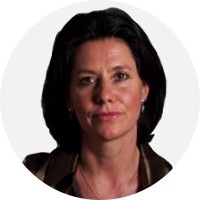The views expressed in our content reflect individual perspectives and do not represent the authoritative views of the Baha'i Faith.
Human beings have always sensed there is more to life than survival. Especially in springtime, we experience a longing for spiritual renewal.
All people possess a consciousness capable of knowing itself, of self-reflection. We each witness our choices and reflect on them. Whether in churches, temples, mosques and synagogues—or outside in nature—we seek that place within, where goodness, truth and beauty seem to converge. We search for meaning.
In that search, we have always intuited the existence of an inscrutable ultimate source, and have sought a relationship with that Creator which some religions call God. In Hinduism, the Mundaka Upanishad describes the ultimate in these words:
Eye cannot see him, nor words reveal him … When the mind is cleansed by the grace of wisdom, He is seen by contemplation …
The Tao Te Ching speaks to the inscrutable nature of the ultimate this way:
Vague and eluding, there is in it the form … Deep and obscure, in it is the essence. From the time of old until now, its manifestations ever remain, by which we may see the beginnings of all things …
 This sensing and searching suggests that we human beings are grounded in ultimate Reality, and that the purpose of life coheres with our essential nature, which impels us to seek to understand that ultimate reality. As we develop into our full humanity, we increasingly manifest insight, purity, wisdom, impartiality, integrity, and compassion.
This sensing and searching suggests that we human beings are grounded in ultimate Reality, and that the purpose of life coheres with our essential nature, which impels us to seek to understand that ultimate reality. As we develop into our full humanity, we increasingly manifest insight, purity, wisdom, impartiality, integrity, and compassion.
But human virtue, meaning and purpose are all in question in our times of deep turbulence, where the desperate search for collective centers of meaning has become deeply polarizing. Whether we find something tangible to rally around in insular populist movements, or in the women’s movement, or in marches to defend science from the onslaught of political expediency, these partial truths only seem to hold in opposition to something or somebody else, fragmenting reality rather than uniting it.
Perhaps the time has come to ask ourselves what holds us together as a collective humanity?
In the early 19th century two mysterious figures, the Bab and Baha’u’llah, boldly confronted that question. They began a worldwide movement for spiritual renewal that became known as the Baha’i Faith. It departed from all previous religious and dogmatic traditions by proclaiming the release of a new spiritual impulse into the world, which propels humanity to search beyond its partial identities in order to find the foundations of a new age of oneness and world unity.
Baha’u’llah, the divine messenger of this new age, wrote:
The world’s equilibrium hath been upset through the vibrating influence of this most great, this new World Order. Mankind’s ordered life hath been revolutionized through the agency of this unique, this wondrous System … – Gleanings from the Writings of Baha’u’llah, p. 134.
The Baha’i teachings say that in order to discern this universal reality:
… the intention must be purified, the effort ennobled and exalted, so that ye may establish affinity between the hearts of the world of humanity. – Abdu’l-Baha, Tablets of the Divine Plan, p. 105.
Throughout his 40 years of ministry in prison and in exile, Baha’u’llah enjoined humanity to:
Immerse yourselves in the ocean of My words, that ye may unravel its secrets, and discover all the pearls of wisdom that lie hid in its depths. – Gleanings from the Writings of Baha’u’llah, p. 136.
After the passing of Baha’u’llah, his son Abdu’l-Baha taught that all the social groupings we are so attached to—churches, religions, scientific disciplines or sub-disciplines, social identities, etc.—are best thought of as part of our quest as social beings for collective centers:
In the contingent world there are many collective centers which are conducive to association and unity between the children of men. For example, patriotism is a collective center; nationalism is a collective center; identity of interests is a collective center; political alliance is a collective center; the union of ideals is a collective center, and the prosperity of the world of humanity is dependent upon the organization and promotion of the collective centers. Nevertheless, all the above institutions are, in reality, the matter and not the substance, accidental and not eternal—temporary and not everlasting. – Tablets of the Divine Plan, p. 101.
In his travels through Europe and the United States in the last years of his life, Abdu’l-Baha explained to a wide range of Western audiences, across universities, churches, synagogues, and meeting halls, that ultimately, “with the advent of great revolutions and upheavals, all these collective centers are swept away.” The only thing that remains eternal, he said, is the collective center of the spiritual teachings of the great world Faiths, which establish relationships between the East and the West, include all lesser collective centers, and reveal the common foundation underlying human diversity.
Today people struggle to discern the universal foundation of life. Secular humanism absolutizes the searching human spirit above and beyond the impact of any eternal collective center. The backlash of fundamentalism insists on the rigid privileging of one expression of the collective center (such as one religious dispensation) over all other expressions of that same collective center, and even over the searching human spirit itself. The Baha’i teachings resolve this split, asking all people to independently investigate the truth and come to their own conclusions.
To counter religious fundamentalism, Baha’u’llah introduced the understanding of progressive revelation. He taught that all the divine prophets, who revealed and founded religions, brought ethical ideals into the human world. Those prophets suffered persecution in order to establish their teachings on the essential realities in human hearts and minds. Yet, these teachings became quickly clouded by human interpretations and dogmatic imitations; which led to religious strife and disagreement, and to the extinguishing of the light of true religion.
Addressing our troubled age, Abdu’l-Baha reminded us that “religion is the outer expression of the divine reality,” that universal “living, vitalized, moving and progressive” core in all spiritual teachings.
So we face a challenge today: to seek the seed of reality in human hearts, amidst the rubble of old traditions and new ways—and to discover the collective center of that changeless faith, eternal in the past, eternal in the future, which animates human civilization and advances it forward.
You May Also Like
Comments

















poor individuals in primitive societies from which few people could have heard of Them let alone had any physically tangible reason to respect Them. This well presented article uncovers some of the reasons why people of faith have solid reasons for valuing the precious pearls of wisdom
to be found in their religions.